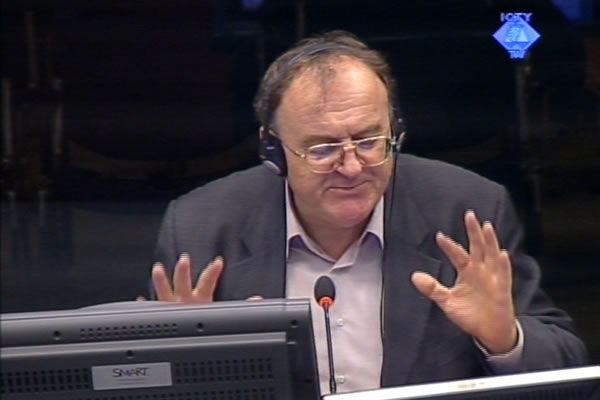Home
DZAKULA: 'SERBS' COMMITMENT TO WAR BENEFITED CROATIA'
The Serb representative in Western Slavonia Veljko Dzakula believes that the war option supported by the accused Goran Hadzic ran counter to the Serb interests in Croatia. It played right into the hands of the Croatian leadership in their bid to capture the territory under the Serb control
 Veljko Dzakula, witness at the Goran Hadzic trial
Veljko Dzakula, witness at the Goran Hadzic trial In the cross-examination of Veljko Dzakula, president of the Serb Democratic Forum in Croatia, Hadzic's defense counsel Zoran Zivanovic tried to refute Dzakula's allegations about the accused as an advocate of the war option and representative of the radical wing of the so-called Republic of Serbian Krajina leadership. Hadzic is on trial for his participation in the joint criminal enterprise aimed at achieving the ethnic cleansing of the territory known as the Serb Autonomous Region of Slavonia, Baranja and Western Srem (SBZS) while he served as the RSK president.
The defense lawyer first tried to show that the accused had not been close with Vojislav Seselj, the Serb Radical Party leader. In the examination-in chief, Dzakula described Seselj as the founder of the idea of an ethnically clean Greater Serbia. The defense argues that Hadzic and Seselj were in a 'very serious conflict'; the Serbian Radical Party (SRP) leader accused Hadzic in the media of being a 'criminal and traitor'. Seselj was known to “praise and attack” various persons at various times, the witness said. Those he would attack from time to time were often Seselj's 'partners', Dzakula noted. Also, Rade Leskovac, the SRP representative in the SBZS region, was Hadzic’s close associate.
In the examination-in chief, Dzakula said that Hadzic had opposed to the signing of the Vance Plan, which called for the cessation of hostilities, the demilitarization of the RSK territory and the return of refugees. According to Dzakula, Hadzic only accepted the plan under pressure from Belgrade. The defense counsel put it to him that the transcript of a meeting of the SFRY presidency in December 1991 didn't lead to the conclusion that Hadzic was openly against the plan. At the time, Hadzic voiced some doubts that ‘indicate he was against signing the plan', Dzakula replied. When the defense counsel put it to him that the accused had thought the Vance Plan would in fact lead to the recognition of Croatia, the witness embarked on a long-winded analysis of the war.
Dzakula said that the 'best way' to achieve the recognition of Croatia and the exodus of the Serbs from the territories where they had been living was to reject the ceasefire and demilitarization of the region. According to Dzakula, while the Vance Plan was in force, Western Slavonia had the smallest number of incidents because the leadership there had demilitarized the area. This was a guarantee that the UN troops would react to any attacks by the Croatian army and police. On the other hand, in areas which were not demilitarized, such as the Knin Krajina, the Croatian military units launched several operations - in Maslenica, the Medak pocket and the Miljevci plateau - killing Serb soldiers and civilians.
Dzakula believes the UN troops didn't react because the Serb side had not demilitarized and they didn't want to stand between the two armed forces. This is why there was no reaction of the UN to Operation Flash in Western Slavonia. He is convinced that there would have been no attack if he and the moderate leadership he headed had not been replaced by the minions of the radical RSK government. 'The peace process we started with the Daruvar Agreement in February 1993 would have progressed by 1995 to such an extent that the Croats would not have been able to attack us by surprise. The Serb side had to maintain the peace initiative, it was our essential obligation and there it was absent. This played right into the hands of the Croatian authorities', the witness concluded.
Dzakula will complete his evidence tomorrow.
Linked Reports
- Case : Hadzic
- 2012-10-19 ‘NO CONDITIONS FOR RETURN, BUT NO EFFORT TO PUT THEM IN PLACE’
- 2012-10-18 HOW HADZIC DECIDED TO GO TO WAR WITH CROATS
- 2012-10-17 ‘THERAPY SESSIONS’ IN DALJ PRISON
- 2012-10-23 HADZIC'S AUTHORITIES OBSTRUCTED RETURN OF CROATS AND SERBS
- 2012-10-30 HOW HADZIC ‘COLLUDED WITH SLOBODAN MILOSEVIC
- 2012-10-31 PEACEMAKER WITH WEAPONS
